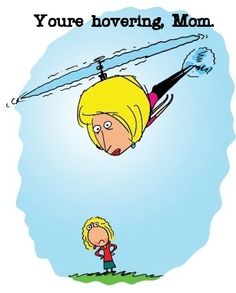
Helicopter parent
A statement many teachers have heard from a child with incomplete homework is, “I had soccer practice and church last night. We didn’t get home until nine, so I couldn’t finish my homework.”
Most parents have their children in extracurricular activities for the right reasons and do not intend for such activities to come before schoolwork. They want their child to explore their passions and talents and to develop socially. However, the parent’s approach determines how much time is spent pursuing these goals for their child. Some of the more common parenting styles are:
- The Tiger Parent
may heavily schedule their child, require hours of practice, long study sessions with few breaks and down times and strive for excellence above all.
- The Helicopter Parent
hovers over their child, micromanaging the smallest facet of their activities and will interfere with the natural consequences of their behavior resulting in a child who is often overly dependent and lacks motivation and self-confidence.
- The Jellyfish Parent
provides little structure, few boundaries, and allows the child almost limitless choices as to the activities the child pursues. They believe their child will somehow find the right path.
- The Dolphin Parent
nudges their child in a particular direction and attempts to balance shared authority over the choices that determine the child’s direction.
Depending on the parents’ personality, it is likely that some element of each of these parenting styles can be of benefit to a child. For example, while the Jellyfish approach may sound like lazy parenting, it is the Jellyfish Parent who is more likely to ensure their children have unstructured time. We used to call it “play”. Children of all ages need some free time where they can do what they want.
Because the number of activities a child can balance varies, it is good for parents to give their child the opportunity to explore a choice of activities and to include them in the selection process, with the understanding that they need to complete the trial period for that activity. When a sample activity is over and they choose not to pursue it, they are not quitting, they are moving on.
Activities should not interfere with the child’s health, grades, family, or his/her free time to learn and explore with no direct adult involvement. And let’s not forget sleeping is an important activity. The National Sleep Foundation states that school age children need 9-11 hours of sleep for maximum development. Time should be devoted to important academic activities first with extracurricular experiences, including unstructured time for themselves, as their schedules allow.
Is your child in too many activities? You will know if you see they have little downtime, they are not practicing and succeeding at the activities they are currently pursuing, and if their schoolwork is suffering. Talk with your child to help balance activities that may be interfering with more important tasks, such as homework. Each child should end up with a highly individualized but balanced schedule that works with your parenting style.
Through this process, they will learn to become more socialized, strengthen decision making skills, develop respect for rules, and manage emotions more effectively. As the philosopher Jean-Jacques Rousseau stated, “You are worried about seeing him spend his early years in doing nothing. What! Is it nothing to be happy? Nothing to skip, play, and run around all day long? Never in his life will he be so busy again.”




[…] in the life of a child. If your child has fallen in with a group of toxic “friends,” finding a new activity or social circle can be very validating and liberating — especially if it is separate from the […]
[…] family, with its powerful interpersonal dynamics, is a cauldron for discourse. However, as these techniques become successful and refined, children […]